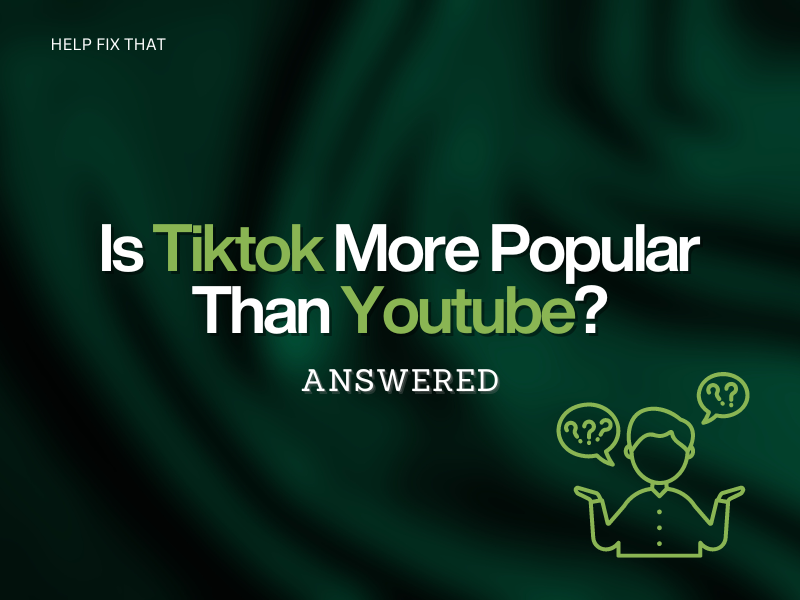TikTok and YouTube have become the playgrounds of self-expression for countless individuals, but heated debates have sparked about which one is more popular than the other.
In this article, we’ll satisfy your curiosity and determine which platform holds the crown in popularity. We’ll also answer who uses them the most and which platform is best for content creators.
Is YouTube or TikTok most popular?
TikTok is more prevalent in emerging markets because it is relatively new and is gaining popularity among young individuals for its short-form videos.
Although YouTube is more popular in the developed market due to its more loyal user base, different content to choose from, and multiple monetization options for the creators.
YouTube has 2.68 billion monthly active users, far more than TikTok’s 1.6 billion. This is because the video platform attracts and retains its viewers with longer videos that offer more value and information.
But in September 2022, YouTube only managed to get 19.7 million downloads globally; however, TikTok got a whopping 74.5 million. Furthermore, the latter also topped the chart for consumer spending that year, followed by YouTube in second place.
Based on user engagement and wide demographics, YouTube is still the most widely used platform, but TikTok is growing rapidly. It’ll be interesting to see how the two compete in the years to come.
Here is a table comparing the two platforms:
| Features | YouTube | TikTok |
| Total Active Users | 2.68 billion | 1.6 billion |
| Average User Age | 25 to 34 years | 18-34 years |
| Ease of Use for Creators | More difficult | Easier |
| Content | Wide variety, including music, education, news, and entertainment | Short-form videos often focused on comedy, dance, and lip-syncing |
| Monetization | Yes, through watch time and advertisements | Yes, through Creator funds |
| Video Length | Up to 12 hours | 15 seconds to 10 minutes |
| UI Focus | Algorithm based | Recommendation and subscription |
Why is TikTok so popular?
TikTok is popular because its algorithm shows personalized content based on online behavior and preferences. This keeps you hooked to the app for a long time without losing interest.
Moreover, unlike YouTube, the TikTok app lets you edit videos with various creative tools. Due to this, you can create stunning content on your phone without purchasing expensive third-party editing software or gadget.
TikTok’s popularity has also sparked due to its short, catchy videos, which are easy to consume and share. In addition, these videos often go viral overnight on the platform, quickly increasing the account followers.
Despite these outclass features, one downside of TikTok is that it provides only a few monetization options to its creators compared to YouTube.
Who uses TikTok the most?
Young individuals between 20-29 years (24.4 % in the US) and females (almost 57%) use TikTok more than YouTube. The platform is also gaining popularity among the younger generation, GenZ or Zoomers (10-16 years), and older people.
Here’s the breakdown of TikTok users by age:
| Age | User percentage |
| 18-24 | 38.9% |
| 25-34 | 32.4% |
| 35-44 | 15.6% |
| 45-54 | 8% |
| 55+ | 5.5% |
Who are the biggest users of YouTube?
The biggest user of YouTube is India, with approximately 467 million people, where TikTok has been completely banned since June 2020. The United States is in second place with around 246 million users, compared to TikTok’s 113.3 million US viewers and creators.
Furthermore, YouTube has a more diverse age demographics, and unlike TikTok, almost 54.4% of its users are male.
Below is the complete overview of YouTube age demographics:
| Age Group | Percentage |
| 18-24 | 15% |
| 25-34 | 20.7% |
| 35-44 | 16.7% |
| 45-54 | 11.9% |
| 55-64 | 8.8% |
| 65+ | 9% |
Which platform is best for creators, TikTok or YouTube?
TikTok and YouTube are best for creators to establish their accounts or channels. However, deciding which platform to use for uploading content depends on multiple factors. These include your goals for videos, target audiences, type and niche of the content, and monetization strategies for your account or channel.
There are some key differences between TikTok and YouTube, which we’ll discuss below to help you decide which platform to choose.
Video Length
TikTok allows only short-form videos of up to 10 minutes and has a quick scroll feature, which provides viewers with more relatable content. On the other hand, YouTube caters to long-form videos, allowing creators to upload content of up to 12 hours.
YouTube has also introduced a new feature called “YouTube Shorts,” for short videos of up to 1 minute.
NOTE: If your creator account is verified, YouTube lets you upload unlimited length and size videos.
Monetization
YouTube has a more established monetization system than TikTok, and you can get paid based on shared ad revenue. However, you can only monetize your channel if it has at least 1000 subscribers and 4000 hours of watch time at the end of the year.
Some of the YouTube monetization options for video content creators are:
- Advertising
- Merch shelf
- YouTube Shorts funds
- Channel memberships
- Super Chat
On the flip side, TikTok does not pay the creators based on their content. Instead, they get paid through sponsored content from brands, creator funds based on video views and engagement, Live gifts from followers, and tips.
Unlike YouTube, TikTok requires creators to have at least 10,000 account followers and 100,000 video views in 30 days to generate revenue.
Audience
Your target audience determines which video-sharing platform is best for you. For example, YouTube caters to a wide demographic, while TikTok tends to skew toward younger viewers and females.
Furthermore, TikTok sets a minimum age of 13 for using its basic features and does not offer the direct messaging feature for users aged 13-15.
Similarly, YouTube allows creators to add age restrictions to videos for users under 18 and offers a dedicated YouTube Kids app for a safer video viewing experience for children.
INFO: Creators can also categorize their content into various niches and playlists on YouTube.
Algorithm
YouTube and TikTok use algorithms to recommend videos to users based on their interests, preferences, and behavior.
TikTok’s algorithm focuses more on the content, so any video can reach a wider audience and go viral overnight through its For You page.
In comparison, YouTube’s algorithm mainly focuses on the creators and their engagement. As a result, new creators have to struggle with SEO optimization to get more subscribers and viewers on their channels.
Conclusion
After a thorough analysis, it is evident that while TikTok has gained remarkable popularity among young users and emerging markets, YouTube remains the most popular platform.
Hopefully, this article has everything you need to understand the differences between TikTok and YouTube subscription battles.


